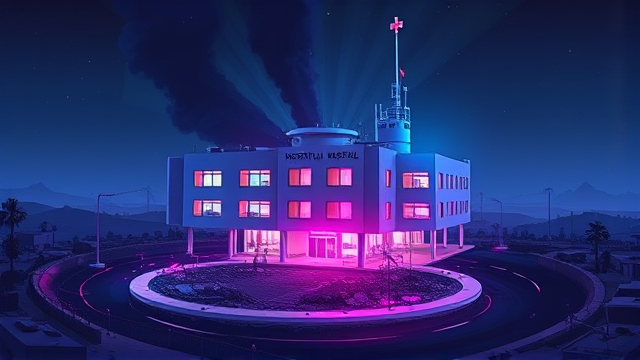Hospital shelling in Sudan kills thirteen, medics allege war crime.
The relentless, grinding violence consuming Sudan has carved another deep scar into the collective conscience of a nation on its knees, with the latest alleged war crime—a direct shelling of a hospital in the besieged city of el-Fasher—leaving at least thirteen dead and confirming our very worst fears about the descent into unbridled barbarism. This isn't just another statistic in a conflict that has faded from the front pages of the global press; it is a deliberate, calculated assault on the last vestiges of humanity, on the very concept of a sanctuary, where doctors and nurses, already operating with barely any supplies, electricity, or clean water, were attempting to perform miracles amidst the chaos.The Sudanese American Physicians Association, a group of medics whose daily reality has become a waking nightmare, didn't mince words, labeling the attack a blatant war crime, a charge that carries the heavy weight of international law but, in the current climate of impunity, feels tragically hollow. To understand the gravity of this moment, one must look beyond the immediate explosion and the rubble; one must see the months-long siege of el-Fasher, the last major city in the Darfur region not yet fully controlled by the Rapid Support Forces (RSF), as a microcosm of a power struggle between generals that has displaced millions and pushed the country to the precipice of the world’s largest hunger crisis.The hospital, once a place of healing, had become a fortress of last resort, its corridors filled not just with the wounded from previous skirmishes but with displaced families who believed its walls might offer some protection from the indiscriminate shelling that has characterized this brutal war. The targeting of such a facility is not an accident of war; it is a tactic, a message of terror intended to break the spirit of a city and crush any remaining resilience.We’ve seen this playbook before, in Syria’s Aleppo, in Mariupol, Ukraine—the systematic destruction of healthcare infrastructure is a hallmark of modern conflict where civilian suffering is weaponized. Experts from organizations like Human Rights Watch have long documented how the warring parties in Sudan have consistently flouted international humanitarian law, with both the Sudanese Armed Forces (SAF) and the RSF accused of committing atrocities, but the international response has been a cacophony of muted condemnations and failed ceasefires.The consequences of this specific attack ripple outwards in devastating waves: it shatters the already fragile healthcare system, deters other humanitarian agencies from operating, and signals to every civilian that there is nowhere left to hide. For the doctors on the ground, people like Dr.Alaa Eltayeb, whose name echoes among the diaspora of medical professionals trying to coordinate aid from afar, this is a personal and professional catastrophe, a betrayal of the Geneva Conventions that feels all the more acute because the world seems to be looking away. The broader context is a nation tearing itself apart, where a power struggle that began in April 2023 between General al-Burhan of the SAF and General Dagalo of the RSF has metastasized into a full-blown civil war, drawing in ethnic militias and foreign actors, with reports of UAE backing for the RSF and Iran supplying drones to the army turning Sudan into a proxy battlefield.The historical precedent is grimly familiar—the ghosts of the Darfur genocide in the early 2000s, where the Janjaweed, the precursor to the RSF, wrought similar devastation, hang heavy over this new chapter of violence, suggesting a chilling cycle of impunity. The analytical insight is stark: without immediate, robust, and coordinated international pressure that moves beyond mere statements to include targeted sanctions, arms embargoes, and a genuine push for a political solution, the map of Sudan will continue to be redrawn in blood, and attacks like the one on the el-Fasher hospital will become the grim norm rather than the shocking exception. The world cannot claim it didn’t see this coming; the warning signs have been flashing red for over a year, and now, as another hospital lies in ruins and more bodies are pulled from the rubble, we are left to wonder how many more war crimes it will take for the global community to find its conscience and act.
Latest News
The political theater outside Westminster Magistrates' Court unfolded with predictable precision Monday morning, as far-right organizer Tommy Robinson—real
31 minutes ago0 comments
In a move that echoes the gravest moments of the Cold War, Britain’s domestic intelligence service, MI5, has issued a stark and unusually public warning to the
1 hour ago0 comments
In a move that will undoubtedly be recorded by future historians as a pivotal moment in the long and tortured history of the Middle East, President Donald
1 hour ago1 comments
In a move that underscores the deeply personal and often cyclical nature of political influence, Labour has appointed Matthew Taylor, the architect of the
1 hour ago0 comments
In a high-stakes maneuver that recalibrates the geopolitical risk profile of the entire Levant, the long-anticipated prisoner and hostage exchange between
2 hours ago0 comments
The political battlefield erupted this weekend when George Finch, the 19-year-old Reform UK leader of Warwickshire county council and the UK's youngest council
2 hours ago1 comments
In a move that will undoubtedly be dissected by historians and political strategists for years to come, President Trump has formally signed a Gaza peace plan,
3 hours ago1 comments
In a move that will be scrutinized by historians for its geopolitical weight, the initial phase of a Gaza ceasefire deal was formally signed in Sharm
3 hours ago0 comments
It’s quiet here...Start the conversation by leaving the first comment.
